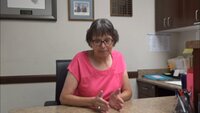| Title |
Brockman, Ruth OH19_095 |
| Creator |
Weber State University, Stewart Library: Oral History Program. |
| Contributors |
Brockman, Ruth, Interviewee; Storey, Sarah, Interviewer; Baird, Raegan, Video Technician |
| Description |
The Beyond Suffrage Project was initiated to examine the impact women have had on northern Utah. Weber State University explored and documented women past and present who have influenced the history of the community, the development of education, and are bringing the area forward for the next generation. The project looked at how the 19th Amendment gave women a voice and representation, and was the catalyst for the way women became involved in the progress of the local area. The project examines the 50 years (1870-1920) before the amendment, the decades to follow and how women are making history today. |
| Abstract |
The following is an oral history interview with Ruth Brockman, conducted on July 10, 2019, by Sarah Storey. Ruth discusses her life, her memories, and the impact of the 19th Amendment. Reagan Baird, the video technician, is also present during this interview.; The following is a video clip of an oral history interview with Ruth Brockman, conducted on July 10, 2019. In this video clip, Ruth discusses the importance of female leadership representation and the impact of the 19th Amendment. |
| Image Captions |
Ruth Brockman (left) & Dauna Seagar (right) Circa 2019; Ruth Brockman discussing the importance of representation in female leadership and the impact of the 19th Amendment. |
| Subject |
Voting--United States; Women--suffrage; Women--Rights of women |
| Keywords |
Healthcare; Seager Memorial Clinic; McKay Dee Hospital; Healthcare for the Underserved Population of Northern Utah; Homeless Population of Northern Utah |
| Digital Publisher |
Stewart Library, Weber State University, Ogden, Utah, United States of America |
| Date |
2019 |
| Date Digital |
2019 |
| Temporal Coverage |
1954; 1955; 1956; 1957; 1958; 1959; 1960; 1961; 1962; 1963; 1964; 1965; 1966; 1967; 1968; 1969; 1970; 1971; 1972; 1973; 1974; 1975; 1976; 1977; 1978; 1979; 1980; 1981; 1982; 1983; 1984; 1985; 1986; 1987; 1988; 1989; 1990; 1991; 1992; 1993; 1994; 1995; 1996; 1997; 1998; 1999; 2000; 2001; 2002; 2003; 2004; 2005; 2006; 2007; 2008; 2009; 2010; 2011; 2012; 2013; 2014; 2015; 2016; 2017; 2018; 2019 |
| Medium |
oral histories (literary genre) |
| Spatial Coverage |
Ogden, Weber County, Utah, United States, http://sws.geonames.org/11788968, 41.22809, -111.96766; Regina, Saskatchewan, Canada, http://sws.geonames.org/6119109, 50.45008, -104.6178 |
| Type |
Text; Image/StillImage; Image/MovingImage |
| Access Extent |
20 page PDF; video clip is an mp4 file, 54.1 MB |
| Conversion Specifications |
Filmed using a Sony HDR-CX430V digital video camera. Sound was recorded with a Sony ECM-AW3(T) bluetooth microphone. Transcribed using Express Scribe Transcription Software Pro 6.10 Copyright NCH Software. |
| Language |
eng |
| Rights |
Materials may be used for non-profit and educational purposes, please credit University Archives; Weber State University; Music from Uppbeat (free for Creators!): https://uppbeat.io/t/yeti-music/gentle-breeze; License code: IWGKRYG7XHQOMZY0; Music from Uppbeat (free for Creators!): https://uppbeat.io/t/simon-folwar/hope; License code: KYI5VLB63GF1TXND |
| Source |
Brockman, Ruth OH19_095 Weber State University Archives |
| Format |
application/pdf; video/mp4 |
| ARK |
ark:/87278/s6z5qqj6 |
| Setname |
wsu_bs_oh |
| ID |
105503 |
| Reference URL |
https://digital.weber.edu/ark:/87278/s6z5qqj6 |
| Title |
Brockman, Ruth OH19_095 |
| Creator |
Weber State University, Stewart Library: Oral History Program. |
| Contributors |
Brockman, Ruth, Interviewee; Storey, Sarah, Interviewer; Baird, Raegan, Video Technician |
| Description |
The Beyond Suffrage Project was initiated to examine the impact women have had on northern Utah. Weber State University explored and documented women past and present who have influenced the history of the community, the development of education, and are bringing the area forward for the next generation. The project looked at how the 19th Amendment gave women a voice and representation, and was the catalyst for the way women became involved in the progress of the local area. The project examines the 50 years (1870-1920) before the amendment, the decades to follow and how women are making history today. |
| Abstract |
The following is an oral history interview with Ruth Brockman, conducted on July 10, 2019, by Sarah Storey. Ruth discusses her life, her memories, and the impact of the 19th Amendment. Reagan Baird, the video technician, is also present during this interview. |
| Image Captions |
Ruth Brockman (left) & Dauna Seagar (right) Circa 2019 |
| Subject |
Voting--United States; Women--suffrage; Women--Rights of women |
| Keywords |
Healthcare; Seager Memorial Clinic; McKay Dee Hospital; Healthcare for the Underserved Population of Northern Utah; Homeless Population of Northern Utah |
| Digital Publisher |
Stewart Library, Weber State University, Ogden, Utah, United States of America |
| Date Digital |
2019 |
| Temporal Coverage |
1954; 1955; 1956; 1957; 1958; 1959; 1960; 1961; 1962; 1963; 1964; 1965; 1966; 1967; 1968; 1969; 1970; 1971; 1972; 1973; 1974; 1975; 1976; 1977; 1978; 1979; 1980; 1981; 1982; 1983; 1984; 1985; 1986; 1987; 1988; 1989; 1990; 1991; 1992; 1993; 1994; 1995; 1996; 1997; 1998; 1999; 2000; 2001; 2002; 2003; 2004; 2005; 2006; 2007; 2008; 2009; 2010; 2011; 2012; 2013; 2014; 2015; 2016; 2017; 2018; 2019 |
| Medium |
oral histories (literary genre) |
| Spatial Coverage |
Ogden, Weber County, Utah, United States, http://sws.geonames.org/11788968, 41.22809, -111.96766; Regina, Saskatchewan, Canada, http://sws.geonames.org/6119109, 50.45008, -104.6178 |
| Type |
Text; Image/StillImage |
| Access Extent |
20 page PDF |
| Language |
eng |
| Rights |
Materials may be used for non-profit and educational purposes, please credit University Archives; Weber State University |
| Source |
Brockman, Ruth OH19_095 Weber State University Archives |
| Format |
application/pdf |
| Setname |
wsu_bs_oh |
| ID |
105695 |
| Reference URL |
https://digital.weber.edu/ark:/87278/s6z5qqj6/105695 |





